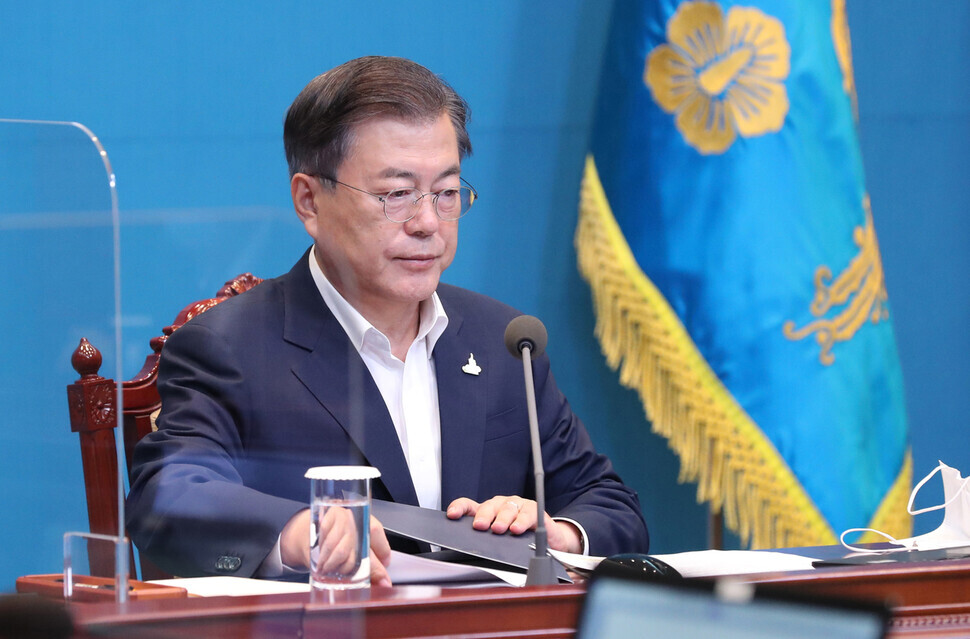hankyoreh
Links to other country sites 다른 나라 사이트 링크
Moon apologizes to public 6 days after death of Oceans Ministry official

President Moon Jae-in shared a message on Sept. 28 expressing the South Korean government’s “feelings of regret” in the fatal shooting of a Ministry of Oceans and Fisheries official by the North Korean military. The South Korean president expressed “profound apologies on behalf of the government, whatever the reasons may have been.”
The apology to the South Korean public came six days after the incident occurred. Moon also shared his hopes that inter-Korean efforts to retrieve the official’s remains and investigate the incident might help to resume dialogue amid the currently strained climate.
Presiding over a meeting of senior secretaries and aides at the Blue House that day, Moon said, “An unfortunate and dismaying incident has occurred. Even if we take the [inter-Korean] division into account, this is something that must never happen.”
“I more than understand the shock and anger that the public is experiencing,” he added. In a message to the victim’s family members and acquaintances, he said, “Regardless of what circumstances led to him being in North Korean waters, I want to share my profound condolences and consolation.”
This marked the first time Moon apologized directly to the public in connection with the official’s death. In past closed-door settings such as a meeting of national security-related Cabinet ministers, he had only expressed dismay toward North Korea while ordering an investigation, without sharing any message of explanation or consolation to the victim’s family and South Korean public. As a result, he has been facing criticism from the political opposition and media, which have accused him of focusing too much on North Korea’s response in the hopes of resuming dialogue rather than on consoling the public and putting minds at ease.
Souring public opinion on inter-Korean relations made apology unavoidableMoon’s apology appears to have stemmed from the concern that severe divisions within South Korean society and growing skepticism on the improvement of inter-Korean relations would inevitably put a serious damper on the Korean Peninsula peace process that he has been investing so much effort in. Another contributing factor making it impossible to put off a presidential apology was the potential for the situation to raise questions about the administration’s governance capabilities, given that no response measures had been taken at the government level in the day and a half between the confirmation of the official’s disappearance and his death at the hands of the North Korean military.
Moon also said on Sept. 28 that he “see[s] it as particularly significant that Chairman Kim Jong-un expressed his profound apology to the South Korean public.”
“He too is taking a serious and somber view of this incident,” he added. His remarks signaled a cautious hope of proceeding somehow with an additional investigation of the incident without provoking Pyongyang.
Moon further offered a hopeful promise to use the investigation process and retrieval of the official’s remains as an opportunity to restore inter-Korean relations.
“I look forward to this being turned into an opportunity for dialogue and cooperation and an occasion for advancing inter-Korean relations, so that this tragic event does not remain simply an incident,” he said.
“I hope that we can preserve the potential for dialogue and usher in cooperation as we work on resolving this incident,” he added.
While he reiterated calls for the restoration and reoperation of an inter-Korean military hotline, Moon did not separately mention his proposal the day before for a “joint investigation” by the two sides. With North Korea having expressed its strong displeasure with the South Korean military’s search operation and insisted that it should not violate North Korean waters, his silence was seen as signaling his aim of finding a compromise without provoking the North Korean military and regime leadership.
By Seong Yeon-cheol, staff reporter
Please direct comments or questions to [english@hani.co.kr]

Editorial・opinion
![[Column] The state is back — but is it in business? [Column] The state is back — but is it in business?](https://flexible.img.hani.co.kr/flexible/normal/500/300/imgdb/original/2024/0506/8217149564092725.jpg) [Column] The state is back — but is it in business?
[Column] The state is back — but is it in business?![[Column] Life on our Trisolaris [Column] Life on our Trisolaris](https://flexible.img.hani.co.kr/flexible/normal/500/300/imgdb/original/2024/0505/4817148682278544.jpg) [Column] Life on our Trisolaris
[Column] Life on our Trisolaris- [Editorial] Penalties for airing allegations against Korea’s first lady endanger free press
- [Editorial] Yoon must halt procurement of SM-3 interceptor missiles
- [Guest essay] Maybe Korea’s rapid population decline is an opportunity, not a crisis
- [Column] Can Yoon steer diplomacy with Russia, China back on track?
- [Column] Season 2 of special prosecutor probe may be coming to Korea soon
- [Column] Park Geun-hye déjà vu in Yoon Suk-yeol
- [Editorial] New weight of N. Korea’s nuclear threats makes dialogue all the more urgent
- [Guest essay] The real reason Korea’s new right wants to dub Rhee a founding father
Most viewed articles
- 160% of young Koreans see no need to have kids after marriage
- 2[Column] Life on our Trisolaris
- 3New sex-ed guidelines forbid teaching about homosexuality
- 4Presidential office warns of veto in response to opposition passing special counsel probe act
- 5How daycares became the most viable business for the self-employed
- 6OECD upgrades Korea’s growth forecast from 2.2% to 2.6%
- 7Amid US-China clash, Korea must remember its failures in the 19th century, advises scholar
- 8Months and months of overdue wages are pushing migrant workers in Korea into debt
- 9[Column] The state is back — but is it in business?
- 10[Guest essay] Maybe Korea’s rapid population decline is an opportunity, not a crisis